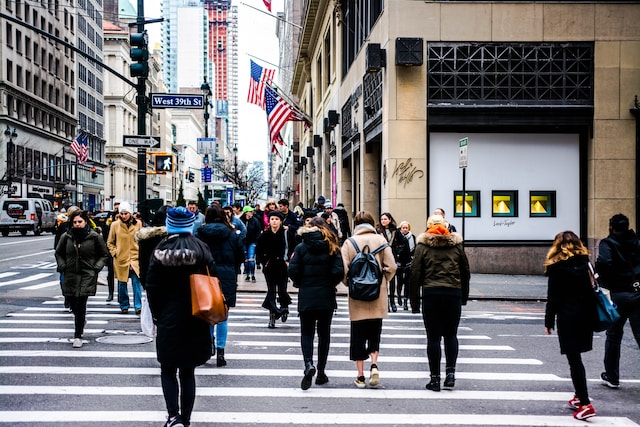Tips for Pedestrian’s Safety and Accident Prevention
Pedestrians are at a high risk of accidents and injuries. According to the United States Department of Transportation, most pedestrian accidents occur at night. This points out that poor visibility is a serious concern, among other factors. While the government and NGOs have various programs to educate the public about their safety, individuals must exercise caution on the road.
Contents
How Can Pedestrians Avoid Accidents?
Use Crosswalks
Cross the road at designated intersections or crossways at all times. Use sidewalks or designated paths away from the road whenever possible, and ensure you walk facing oncoming traffic. When crossing the street, follow traffic rules and signals—wait for your turn and don’t cross against the traffic flow. Look in all directions when crossing an intersection.
Adhere to Your Jurisdiction’s Set Laws
Each state has its own governing rules. In Colorado, right-of-way laws play a significant role in determining liability. According to Section 42-4-802, pedestrians should yield the right of way to cars legally occupying and moving through lanes of traffic. In addition, if a vehicle has stopped to allow pedestrians to cross the road, other cars behind it shouldn’t overtake the stopped car. ColoradoInjuryLaw.com can help you get compensation if you were injured as a pedestrian in Colorado.
Increase Visibility
Pedestrians should wear bright clothing that is easily noticed, such as fluorescent shades and orange, and wear reflective accessories like vests or belts. At night, always wear reflective gear to help drivers spot you easily. In addition, make your intentions clear by using hand signals and gestures to inform the driver that you intend to cross the road. While crossing, make eye contact with the driver before proceeding. This ensures they notice your presence.
Avoid Distractions
Pay attention while crossing the road or walking along the highway, and avoid distractions. Avoid using headphones because they can block out important sounds like approaching cars. In addition, put your phone away because calling and texting take your eyes and ears off the road. Being alert will help you notice dangers and react immediately.
Be Sober
Avoid walking while under the influence of substances or drugs. Alcohol can impair your judgment and coordination, making it difficult to make quick decisions about crossing the road safely. You’re also likely to lose balance. When not sober, you are less aware of your surroundings, meaning you won’t pay attention to oncoming vehicles. Alcoholism will also make you vulnerable to other accidents, like falls.
With thousands of pedestrians dying yearly in motor vehicle accidents, everybody must prevent them. While most people blame pedestrians after an accident, car drivers are to blame.
How can Drivers Prevent Pedestrian Accidents?
- Avoid speeding: Speeding reduces the driver’s ability to react to unexpected occurrences, such as a person crossing the road. While driving, observe speed limit signs on the road and always be ready to stop or slow down if necessary.
- Use headlights appropriately: Drivers should use headlights at night to improve visibility. This helps road users see an approaching vehicle.
- Exercise caution in bad weather conditions: During snow, rain, or fog, drivers should use headlights and reduce speed. Adverse weather conditions, poor visibility and slippery roads can increase the risk of accidents.
- Be cautious of blind spots: It’s hard to see pedestrians in blind spots. So, be careful before changing lanes or turning.
- Be patient: Some pedestrians, such as old and physically challenged people, may be unable to move quickly, so give them time to cross safely.
Whether you’re a pedestrian or a driver, staying safe is important. While on foot, use the crosswalks or other designated pedestrian paths, avoid distractions, and wear reflective clothing to increase visibility. Drivers should also exercise caution on the road to prevent pedestrian accidents. Contact a qualified lawyer to file a compensation claim if your loved one is injured.

